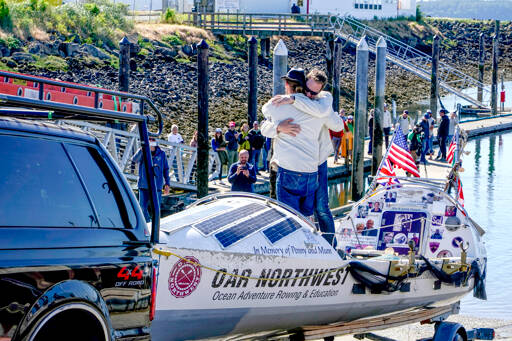PORT TOWNSEND — A world record-setting rowboat that was once paddled from New Jersey to England met its final end in Port Townsend, taken in by the state Department of Natural Resources’ derelict vessel recycling program.
The James Robert Hanssen, a 30-foot rowboat built for the trans-Atlantic voyage, was brought ashore Monday in Port Townsend, stripped of parts and cut into pieces that will be taken to a special recycling facility in Bothell.
“This has been really beautiful,” said Jordan Hanssen, the boat’s owner and one-time captain.
Bagpipers and an Irish string band played funerary music in the Port Townsend Boat Haven parking lot as the boat was brought ashore, a ceremonial “wake” for the storied vessel.
“This boat’s been across the ocean twice,” Hanssen said, becoming emotional as he watched his friends and former crewmates strip the vessel. “She was lost and then found again.”
In 2006, Hanssen and three others set the Guinness World Record for first row across the Atlantic west to east from U.S. land to land by a team of four, a journey which took 71 days.
The James Robert Hanssen — named for Jordan’s biological father who died when Jordan was 3 — once capsized near the Bermuda Triangle but was later recovered, something Hanssen called “a miracle.”
“Like finding a needle in a haystack,” he said.
It spent several years at a museum in Tacoma. But the museum told Hanssen it could no longer house the vessel, and the boat had fallen into disrepair. That’s when Hanssen contacted DNR about disposing of the vessel and was told about the recycling program.
Though it broke his heart to see the vessel disassembled, Hanssen said the recycling program was the most responsible way possible to dispose of the boat.
“I hated that,” Hanssen said of the idea of his boat ending up in a landfill.
Monday was the second vessel recycling event DNR has held, said Troy Wood, the derelict vessel removal program manager, but the agency hopes to have others.
“What we plan on doing in conjunction with the (Washington) Sea Grant, the Northwest Straits Commission and a lot of the port districts,” Wood said, “is to go into an area and open up an event where people can bring their vessels for free disposal and recycling.”
DNR has contracted with Delta Tango Gamma Recycling of Bothell to take the remnants of the derelict vessels. Large blue roll-off dumpsters sat in the demolition section of the boatyard, and Wood said so long as the pieces could fit in those bins, DTG would take them.
According to Wood, other companies required that boats be broken into 1-inch pieces, which he said was wildly impractical. On Monday, Port of Port Townsend staff hired by DNR took powered saws to the boat’s body, cutting it into smaller pieces, preserving for its former rowers some of its more sentimental pieces while dozens of onlookers watched from a safe distance.
“It’s all part of our prevention,” Wood said. “So we can prevent abandoned and derelict vessels from impacting the environment and water user safety.”
Wood said before the recycling program, derelict fiberglass or wooden vessels would be taken to landfills, and DNR has removed more than 1,000 vessels from the water in the past 20 years.
In 2022, the state Legislature dedicated $100,000 to DNR to create the derelict vessel recycling program, and boat owners can turn their boats into the program for free if they meet certain criteria.
The James Robert Hanssen made its last voyage this weekend when it delivered beer to the Race to Alaska Ruckus, a celebration held in Port Townsend on Sunday to mark the end of the SEVENTY48 race from Tacoma and the beginning of the Alaska race, which ends in Ketchikan.
“It’s been an incredible ride,” Hanssen told the crowd at the boatyard on Monday. “Meeting all of you has been one of the richest things of my life. It’s amazing that just a simple piece of fiberglass could do that.”
________
Reporter Peter Segall can be reached at peter.segall@peninsuladailynews.com.

